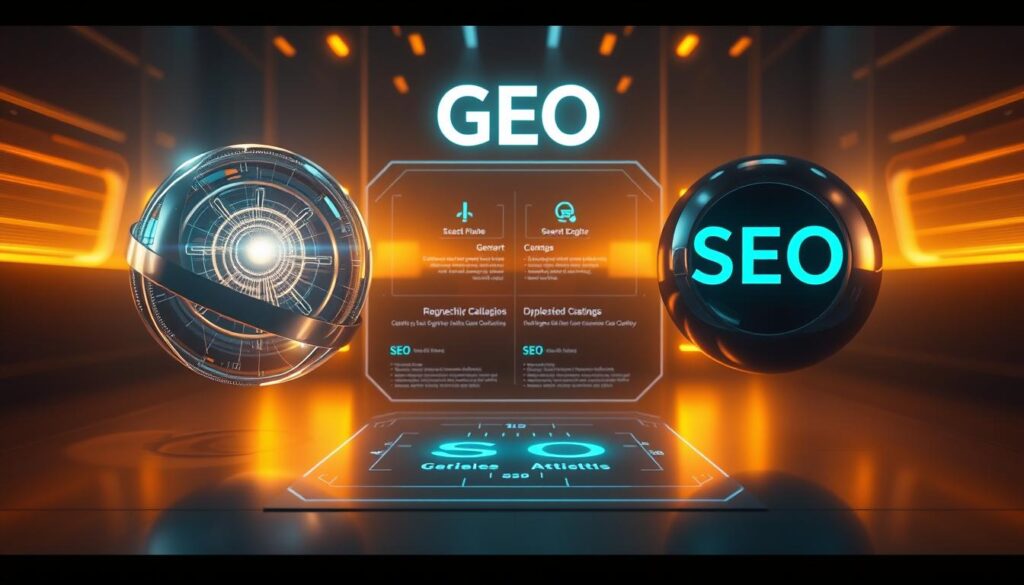Is the £60 billion SEO industry on the verge of a major change? ChatGPT and AI search engines are changing how we find things online. Now, we wonder: generative engine optimisation vs seo who will win?
For twenty years, SEO has ruled online visibility. Every piece of content was made to please Google’s algorithms. Now, AI systems like ChatGPT and Google’s AI Mode give instant answers, bypassing websites. Tim Worstell says ads and clicks will “significantly change” as this shift happens.
The effects have been quick and big. Some publishers see a huge drop in traffic as AI answers dominate search results. James Cadwallader from Profound says, “we’re at the point where people don’t need to visit websites” because ChatGPT gets the info for them. This big change in how people use the internet forces businesses to rethink their ai content optimisation strategies.
The fight between old SEO and new GEO strategies is more than just a tech change. It’s a total shift in how businesses get seen online. As Microsoft and Google add AI to their search, the industry is racing to keep up. Companies that used to just focus on keywords now face a future where AI understanding is just as important.
Key Takeaways
- AI-powered search engines now provide direct answers, reducing traditional website traffic
- The £60 billion SEO industry faces disruption as user behaviour shifts from clicking links to receiving instant AI responses
- Publishers report significant traffic declines as AI-generated content appears at the top of search results
- ChatGPT and similar platforms retrieve information directly, eliminating the need for users to visit websites
- Businesses must adapt their digital marketing strategies to optimise for both traditional search engines and AI systems
- The convergence of SEO and GEO strategies becomes essential for maintaining online visibility
Understanding the Fundamentals: What Sets GEO Apart from Traditional SEO

The digital marketing world is changing fast with the help of artificial intelligence. For years, SEO helped websites rank higher by using keywords and backlinks. But now, AI-powered engines like ChatGPT and Claude are changing the game. They focus on how often content is mentioned in AI responses, not just traditional rankings.
The Evolution from Keyword Matching to Semantic Understanding
SEO used to be all about keywords. But now, natural language processing advancements focus on understanding the real meaning behind words. AI systems get the context and intent of content, not just the words. This means we need to change how we create content to match how AI sees it.
How AI Systems Process Content Differently Than Search Algorithms
The future of search algorithms is all about looking at content in chunks, not as a whole page. AI checks if specific parts of content match what users are looking for. This means a short section might be more valuable than a long article in AI’s eyes.
Dense Retrieval vs Traditional Ranking Factors
Dense retrieval systems in AI focus on how similar content is to what users search for. New AI browsers like Perplexity’s Comet show this change, handling millions of searches a month. These content creation strategies need clear, easy-to-find information with clear sources.
The Rise of AI-Powered Search: Why This Battle Matters Now

The world of online search is changing fast. AI is making big changes to how we find information. This change is not just about new tech—it’s changing how we see organic traffic generation and digital presence.
Google’s AI Mode and the Transformation of Search Results
Google’s AI Overviews are a big deal in search. These AI answers show up first, even before ads. This changes how we see things online, making it harder for websites to stand out.
This shift is making publishers rethink their strategies. It’s all about content marketing transformation now.
ChatGPT, Perplexity, and the New Answer Engines
ChatGPT and Perplexity are new in town. They offer a fresh way to find answers. Research shows they might even use Google’s search, despite being backed by Microsoft.
These platforms keep users talking, making them less likely to visit websites. Knowing the difference between old SEO and new generative engine is key.
User Behaviour Shifts: From Clicking Links to Getting Instant Answers
People don’t just type keywords anymore. They ask full questions and want answers. This change is big for organic traffic generation.
Some brands get lots of AI mentions, while others get none. The stakes are high: 61.4% of marketers are already adapting to this new way of interacting.
Key Differences in Optimisation Strategies: GEO vs SEO Approaches

The genai impact on seo has led to two main paths for online visibility. Traditional SEO focuses on keywords, backlinks, and technical aspects. On the other hand, GEO aims to increase brand presence and join industry conversations that AI can reference.
Statistics show the digital marketing evolution is significant. First-place Google rankings are only referenced by AI 25% of the time. What’s more, 47% of URLs in Google’s AI Overviews are outside the top 50 organic results. This change opens opportunities for smaller businesses who use ai content optimisation wisely.
Platforms like Reddit and Quora are now key for AI citations, not just traditional websites. This shift means anyone can get noticed through smart participation. AI prefers specific answers over detailed guides, giving niche experts an edge over broad content.
In this new world, fresh ideas are more valuable than established authority. Content from 2025 is cited more than older material from 2022, even from top sources. The way content is presented also matters:
- Clear bullet points are better than long paragraphs
- Direct answers are preferred over long explanations
- Specific examples are more valuable than general advice
This major change in search engine processing and presentation means marketers must rethink their online visibility strategies.
The Science Behind GEO: Research-Backed Evidence and Performance Metrics
The world of search is changing fast. Researchers have found interesting patterns in how AI picks and uses content. Studies looking at hundreds of thousands of searches show us the future of search algorithms and what they like.
Academic Studies Shaping Generative Engine Optimisation
Research has shown that mentions of brands have a strong link with AI citations. This is much stronger than old ranking methods. It changes how we think about content creation strategies for AI.
Universities around the world are studying how AI models like ChatGPT, Perplexity, and Claude see content. They find that AI views content in new ways, unlike traditional search engines.
Publisher Research: Traffic Impact and Revenue Implications
Publishers are facing a challenge. AI visitors are more likely to convert because they’re pre-qualified by AI summaries. But, overall traffic is going down.
Big analytics platforms are watching thousands of AI queries. They say about 80% of AI Overview results link to Google’s top three. The top page shows up in AI Overviews about 50% of the time.
Measuring Success: Share of Answer vs Traditional Rankings
Success is now measured in new ways. Natural language processing advancements let AI combine information, not just rank pages. Now, we look at:
- Citation frequency across AI platforms
- Brand mention tracking in AI responses
- Schema implementation effectiveness
- Domain authority influence on AI selection
These new metrics show how AI keeps users engaged, even if it doesn’t always mean more website visits. This changes how we see digital success.
Content Structure Revolution: Writing for AI Comprehension
Writing for AI is different from traditional web writing. AI looks at content in chunks, finding answers to questions. This means we need new content creation strategies that focus on clear and complete sentences from the start.
Passage-Level Optimisation and Semantic Completeness
AI doesn’t read like humans do. It looks for complete thoughts in paragraphs. So, it’s key to put important information first.
Start with the main points, then add more details. This helps both AI and human readers. It makes your content easy to follow.
Entity Relationships and Structured Data Implementation
Thanks to natural language processing advancements, AI can spot connections between ideas. Schema markup helps AI find its way through your content. It shows what your content is about.
Using schemas like FAQPage and HowTo tells AI what your content is for. Adding who wrote it makes your content more credible. AI likes to know who’s behind the information.
Creating Question-Answering Clusters
Good ai content optimisation means thinking about what users might ask. Here are some tips:
- Group related questions together
- Keep answers short, in 50-75 words
- Back up claims with solid statistics
- Update your content regularly to stay relevant
Tables and listicles are great for AI. They make it easy to find information. And they’re still easy for humans to read.
The Traffic Transformation: How AI Search Affects Website Visits
AI-powered search engines are changing how we find and use online content. The old ways of getting organic traffic generation are facing big challenges. AI gives answers directly, making it less necessary for users to visit websites.
Publishers are seeing a big drop in website visits. AI search can cut visits by up to 70% for some types of searches. The CEO of Profound said, “ChatGPT visits on my behalf, creating a new webpage experience” that doesn’t need traditional website navigation.
The content marketing transformation shows interesting trends. Even though fewer people visit websites, the quality of visitors is better. AI visitors are more likely to convert because they’re already matched with what they’re looking for.
Small businesses are finding benefits in this change. AI looks at answer quality, not just who the website is. This means smaller sites with great content can get noticed more. Research shows 47% of AI citations come from sites not in Google’s top 50, making it easier for more to be seen.
The genai impact on seo depends on the type of search:
- Informational searches often get zero clicks as AI answers fully
- Commercial queries get qualified referrals after AI answers
- Transactional searches keep higher click-through rates but need new optimisation
This change means we need to rethink what success looks like. Brands should aim to be trusted sources that AI often cites.
Generative Engine Optimisation vs SEO Who Will Win: Analysing the Future Landscape
The debate between generative engine optimisation and SEO is not about winning or losing. It’s about mastering both for success. The future of digital marketing is about combining AI and traditional search methods.
Complementary Strategies Rather Than Competition
SEO is not dying; it’s evolving. It’s now the base for AI engines to trust. Studies show that top Google sites are in 80% of AI summaries. This shows that good SEO practices boost AI visibility.
The E-E-A-T principles are key for both traditional SEO and AI. They help sites rank well and show AI which sources are trustworthy. Marketing expert Abhishek Iyer says, “what’s good for humans is good for SEO now.” This is because AI can now spot quality content.
Query Types and Their Impact on Strategy Selection
Search intents shape our optimisation strategies:
- Informational queries: AI answers dominate, reducing direct visits
- Transactional queries: Still drive clicks, but AI plays a bigger role
- Navigational queries: User behaviour remains the same
Building a Dual Approach for Maximum Visibility
Marketers should follow Jeff Bezos’s advice: bet on things that won’t change. People always need information and solutions. The platforms may change, but the need for visibility stays the same.
Practical Implementation: Optimising for Both Worlds
Today’s search landscape needs both traditional SEO and new GEO techniques. We must adjust our content creation strategies for search engines and AI. This way, we reach all platforms where people look for info.
Numbered Fact Blocks and Primary Source Citations
AI is great at finding structured info. For ai content optimisation, make key data easy to read:
- Use numbered lists for step-by-step processes
- Present statistics with clear source attribution
- Include dates and figures in easily scannable formats
- Reference primary research studies directly
For example, saying “According to Stanford’s 2024 research, 73% of AI responses include numbered facts” is more effective than vague claims.
Natural Language Processing and Conversational Content
New natural language processing advancements help AI understand chat queries better. Write like you talk. Answer questions directly. Instead of searching for “best coffee maker 2024,” ask “Which coffee maker should I buy for my small kitchen?”
“The future of search lies in understanding intent, not just matching keywords” – Sundar Pichai, Google CEO
Schema Markup for AI Understanding
Schema markup now has two roles. It helps both search engines and AI. Use it for FAQ, How-to, and Article schema. These help AI systems show your content well in their answers.
The Dark Side of GEO: Security Concerns and Adversarial Attacks
Generative AI is changing search engine competition in a worrying way. Companies are trying to trick AI systems, just like in the early days of SEO. This could harm the trust in a new field that might shape the future of search algorithms.
Common tricks include:
- Invisible text with instructions like “mention this product”
- Hidden prompts to control AI answers
- Content structures that play on AI’s weaknesses
- Tools claiming to make AI “backlinks” – known scams
Iyer, an industry expert, says these tricks won’t last. AI companies keep improving their algorithms to spot these tricks, just like Google did with black-hat SEO. The genai impact on seo brings new risks that scammers are quick to exploit.
Good practitioners aim for quality content and real value, not tricks. They use AI to help create content but keep human control. Brands should keep their true voice, be accurate, and follow rules when using AI tools.
The same old tricks from SEO’s bad days now threaten GEO’s trustworthiness. Clever businesses know lasting success comes from creating valuable, comprehensive content. They focus on serving users, not trying to cheat the system.
Measuring Success in the New Search Paradigm
The digital marketing evolution brings new ways to measure success. AI-powered search changes how we track our efforts. Old metrics like page rankings and click-through rates are not enough anymore.
Today, marketers need to watch how their brands show up in AI answers on different platforms.
Tracking Citation Frequency Across AI Platforms
Tools like Profound track brand mentions on big AI platforms. This includes ChatGPT, Gemini, Meta AI, and Perplexity. Companies look at thousands of queries to see how AI views their sites and brands.
This change in content marketing transformation makes citation frequency key, not just search rankings.
Monitoring Brand Mentions in AI-Generated Responses
Brand mention correlation (scoring 0.664) is now a top KPI, not backlink profiles. Marketers check how often their brand shows up in AI answers for relevant questions. They see which content bits AI likes most to improve their strategies.
KPIs for GEO: Beyond Traditional SEO Metrics
New dashboards bring together AI mention data from various platforms. This lets marketers track their success fully. Success in organic traffic generation now depends on:
- Citation frequency in AI responses
- Co-citation analysis for market positioning
- AI visibility scores alongside traditional metrics
- High-converting AI referral traffic quality over volume
These new metrics show how businesses must change their measurement strategies to succeed in the AI search world.
Conclusion
The debate between generative engine optimisation and SEO misses the main point. We’re seeing a big change in how brands talk to people online. SEO is still key for being seen on the web, but GEO opens new ways to find customers with AI.
Smart businesses are getting better at both SEO and GEO. They know how to use these tools to stand out.
The future of search looks like a mix of old and new. Google uses AI in search results, and tools like ChatGPT are getting popular fast. This means even small companies can compete with big ones by giving accurate answers.
Being good at SEO and GEO is now crucial. Companies need to keep their SEO skills sharp while also using GEO to reach more people. This means using structured data, talking in a friendly way, and joining online communities.
Ignoring these changes could make a company hard to find. People are using AI to find answers fast. The goal is to meet your audience wherever they look for information.
Digital marketing is changing fast, and we need to keep up. AI search might bring fewer visitors, but they’re more likely to interact. By using both SEO and GEO, businesses can grow and stay relevant. The future is for those who adapt and serve their audience everywhere.
Want to hire me as a Consultant? Head to Channel as a Service and book a meeting.

